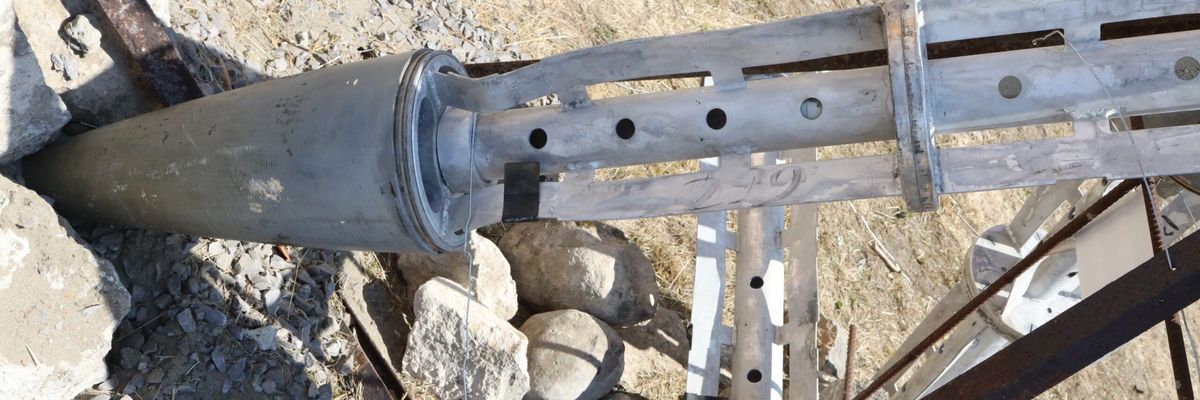With Ukraine’s long-awaited counteroffensive underway, there’s a controversial weapon hailed by advocates as a potential game changer in Kyiv’s fight. Ukraine asked for it. Some Republicans push for it. A top Democrat is warming to it. Only last week, a senior Pentagon official suggested this weapon could prove “useful especially against dug in Russian positions on the battlefield.” But what is it, and what are the risks to a benevolent Uncle Sam?
While cluster munitions might offer tactical value to Ukraine, a “yes” from the Biden administration poses greater risk than reward for the United States on both the political and diplomatic fronts.
Cluster munitions, launched from air or ground, break apart in mid-air to scatter a large number of explosive submunitions known as ‘bomblets.’ The tactical military advantage of cluster munitions stems from use “against mixed targets of personnel and equipment, especially when those targets are gathered into dense formations,” top NATO commander Gen. Christopher Cavoli told Congress in April.
These weapons of war are rightly stigmatized for their immediate and long-lasting dangers to civilians. Independent estimates put the failure rate of cluster bombs as high as 10 to 40 percent, leaving unexploded remnants to kill and maim unsuspecting civilians long after a conflict’s end. Children especially make up a large number of victims as they are drawn to the shape, size, and color of cluster submunitions often found embedded in the ground.
Widely shared humanitarian concerns led 123 states to ban the use, transfer, and possession of cluster munitions in 2008. The United States, Russia, and Ukraine notably abstained as parties to the Convention on Cluster Munitions, leaving the door open to use and stockpiling of the indiscriminate weapon for future conflicts.
The Biden administration rightly expressed concerns over ceding these weapons to Ukraine but declined to rule them out entirely when whispers of Kyiv's request first emerged. More recently, the White House walked back an assertion by U.S. Ambassador to NATO Linda Thomas-Greenfield that cluster bombs have no place on the battlefield. But, in some ways, U.S. policy already acknowledges Thomas-Greenfield’s concerns: Providing cluster bombs to Ukraine would require a presidential override to existing export moratoriums on munitions exceeding a 1 percent dud rate.
Leaving cluster munitions open for consideration is a bold move for a president on the verge of a fierce election season. Biden already boasts a shockingly low approval rating at home of 39 percent. Reporting indicates that cluster munitions killed or injured nearly 700 civilians in Ukraine in just the first half of 2022. Should the White House really take a gamble on heart-rending images of Ukrainian children disfigured and limbless by weapons supplied from its own stockpile?
Only last August, the U.S. announced it would provide $89 million to aid Ukraine with the removal of unexploded ordnance across its territory. Anti-personnel landmines and explosive remnants are littered across swaths of Ukraine that equate to the size of Virginia, Maryland, and Connecticut combined, according to Politico. The challenge of clearing these explosives would only be further amplified by a U.S. contribution of cluster munitions to the conflict.
Despite Rep. Adam Smith’s (D-Wash.) own softened stance on the issue, President Biden isn’t likely to obtain broad support from those within his party. Four leading Democrats last year urged the administration to review U.S. policy on cluster munitions, calling for America to champion human rights and ban the use and production of the controversial weapon.
Domestic considerations are not the only cause for concern. The Biden administration also risks alienating transatlantic partners and splintering NATO. The 23 NATO members party to the Convention on Cluster Munitions are prohibited from transferring cluster bombs either “directly or indirectly.” This means the United States may not count on allied backing in the form of rail load assistance, naval support, seaports, or airfields for delivery of the controversial weapon.
Procuring transit routes through non-party states like Poland and Romania sets a dangerous precedent should other NATO powers even consent to a U.S. transfer. NATO powerhouse Germany already balked at the idea of cluster munitions for Ukraine, urging allies to draw a line at Kyiv’s “unreasonable” request in February.
Proponents, however, believe the benefits outweigh the risks. As Ukraine hemorrhages artillery shells, allies are depleting their own stocks to keep the front lines supplied. Cluster munitions offer a logical choice in their swift delivery to the front lines and their perceived strategic value in defeating the Russians. Russia, for its part, has used these weapons against civilian and military targets in a series of alleged war crimes, which led Ukraine to retaliate with cluster munitions supplied by Turkey.
The strategic value of these weapons isn’t sure, but the risk is. “The ability of Ukraine to make gains in current and upcoming phases of conflict is in no way dependent on or linked to their procuring said munitions,” a congressional aide told CNN in December.
The president’s softened stances on Abrams tanks and F-16 fighter jets are one thing. Releasing an internationally condemned weapon is quite another. President Biden should resist pressure from both Ukraine and U.S. lawmakers to deliver cluster munitions eastward. The reputational risk of providing such a controversial armament is simply not worth taking.
















